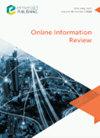事实核查有效性的实验研究:证据类型、真实性和新闻一致性的相互作用
IF 3.1
3区 管理学
Q2 COMPUTER SCIENCE, INFORMATION SYSTEMS
引用次数: 0
摘要
鉴于错误信息纠正工作的快速增长,本研究旨在测试证据类型和真实性如何与事实核查的有效性的新闻协议相互作用,以及纠正信息对虚假新闻信息的折扣程度。设计/方法/方法2019年,香港的实验参与者(N = 511)先看同一篇新闻文章,然后再看一篇纠正性信息,以不同的证据类型(数字vs叙事)和准确性(没有结论vs半假vs完全假)揭穿新闻文章。在不同意新闻文章的参与者中,数字事实核查比叙述事实核查更有效地贬低新闻文章。在文章态度不一致的参与者中发现了一些适得其反的证据。原创性/价值当人们接触到与态度不一致的新闻来揭穿虚假信息时,以半假量表的形式呈现的较温和的判决比完全虚假的量表更能促使人们对利害攸关的问题产生更积极的看法,这意味着与确定的判决相比,不太确定的判决有助于减轻适得其反的效果。本文章由计算机程序翻译,如有差异,请以英文原文为准。
An experimental study of the effectiveness of fact checks: interplay of evidence type, veracity and news agreement
PurposeGiven the rapid growth in efforts on misinformation correction, the study aims to test how evidence type and veracity interact with news agreement on the effectiveness of fact-checking on how well a corrective message discount a false news information.Design/methodology/approachExperimental participants (N = 511) in Hong Kong were exposed to the same news article and then to a piece of corrective information debunking the news article with variation in the types of evidence (numerical vs narrative) and veracity (no verdict vs half false vs entirely false) in 2019.FindingsAmong the participants who disagreed with the news article, numerical fact-checking was more effective than narrative fact-checking in discounting the news article. Some evidence of the backfire effect was found among participants for whom the article was attitude incongruent.Originality/valueWhen debunking false information with people exposed to attitude-incongruent news, a milder verdict presented in the form of a half-false scale can prompt a more positive perception of the issue at stake than an entirely false scale, implying that a less certain verdict can help in mitigating the backfire effect compared to a certain verdict.
求助全文
通过发布文献求助,成功后即可免费获取论文全文。
去求助
来源期刊

Online Information Review
工程技术-计算机:信息系统
CiteScore
6.90
自引率
16.10%
发文量
67
审稿时长
6 months
期刊介绍:
The journal provides a multi-disciplinary forum for scholars from a range of fields, including information studies/iSchools, data studies, internet studies, media and communication studies and information systems.
Publishes research on the social, political and ethical aspects of emergent digital information practices and platforms, and welcomes submissions that draw upon critical and socio-technical perspectives in order to address these developments.
Welcomes empirical, conceptual and methodological contributions on any topics relevant to the broad field of digital information and communication, however we are particularly interested in receiving submissions that address emerging issues around the below topics.
Coverage includes (but is not limited to):
•Online communities, social networking and social media, including online political communication; crowdsourcing; positive computing and wellbeing.
•The social drivers and implications of emerging data practices, including open data; big data; data journeys and flows; and research data management.
•Digital transformations including organisations’ use of information technologies (e.g. Internet of Things and digitisation of user experience) to improve economic and social welfare, health and wellbeing, and protect the environment.
•Developments in digital scholarship and the production and use of scholarly content.
•Online and digital research methods, including their ethical aspects.
 求助内容:
求助内容: 应助结果提醒方式:
应助结果提醒方式:


